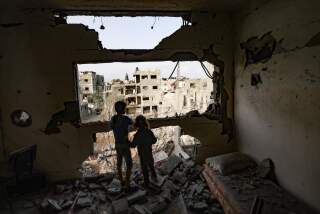For Soldier, Peacemaking Proves Deadlier Than War
- Share via
JABAL OS SARAJ, Afghanistan — As a soldier, Abdul Haq took risks that few others would and he came out alive each time. He understood war. It was the dirty work of peacemaking that appalled him, and it ultimately cost the war hero his life.
Haq was a rare character in the cutthroat world of Afghan politics, a veteran of the moujahedeen uprising against Soviet occupation who refused to join the warlords in carving up the country after the Soviets pulled out in 1989.
Instead, he went into exile in the neighboring Pakistani city of Peshawar. But although he was out of the country, he wasn’t out of his Afghan enemies’ reach: As he was working to build a more moderate alternative to Taliban rule two years ago, assassins burst into his home and killed his wife and their 11-year-old son.
The U.S. State Department and groups such as Human Rights Watch concluded that the attack was probably the work of the Taliban. Haq, who was in the United Arab Emirates when the killers took his family from him, decided that he’d had enough. He gave up on Afghanistan and moved to Dubai.
But shortly after the Sept. 11 terrorist attacks on the United States, he returned to Peshawar to try again. He was sick, he said, of the world seeing Afghans as a bunch of heroin-smuggling terrorists.
In an interview two days after he arrived in Peshawar, Haq talked a lot about the humiliation he had suffered simply because he was an Afghan with enough means to travel to the West.
Here was a man wounded 16 times in battle, a Cold War ally of the U.S. who once briefed President Reagan’s top security and intelligence officials in Washington. Now he had to explain himself to every suspicious immigration officer.
His way of dealing with the worst of life was to joke about it.
“Even if an Afghan had a visa to get into a cemetery, they would refuse to bury him,” he said.
Haq was the first moujahedeen commander to take the fight against the Soviets to the Afghan capital, Kabul, and he lost a foot to a land mine during the war. He laughed it all off, as many veterans do. What really weighed on Haq’s mind was the secret diplomatic mission he was embarking on: an attempt to persuade fellow Pushtuns to turn against the ruling Taliban.
The Taliban draws most of its support from Afghanistan’s Pushtun majority, and the United States has clearly hoped for a Pushtun uprising against the regime.
“The easiest thing in the world is to take a gun and fight,” Haq said in the September interview. “To talk, and convince people, is difficult. In war, if you don’t like someone, you just shoot him. But in diplomacy, whether you like him or not, you have to smile and talk to him.”
Haq had been burned by politicians and diplomats many times.
He felt that the U.S. had betrayed Afghanistan by following the advice of Pakistan’s military intelligence, the Inter-Services Intelligence agency and giving its strongest covert military support to Gulbuddin Hekmatyar, a radical Islamic moujahedeen leader.
Hekmatyar was not the key military commander that Pakistan made him out to be, Haq and others argued. And when the Soviets withdrew, Hekmatyar and his men would commit some of the worst atrocities in Afghanistan’s ruthless civil war. He is now a sworn enemy of the United States.
Haq was not a supporter of the Northern Alliance opposition forces now fighting to topple the Taliban. But the alliance’s fighters frequently make the same complaint about Washington’s close cooperation today with Pakistan--whose military intelligence officers helped create, train and arm the Taliban--as Haq did in regard to Hekmatyar so many years ago.
“Because of the Russian withdrawal, many people in the U.S. government got big medals, promotions and early retirement, because they did such a great job,” Haq said in the September interview.
“But these [foreign] people who they brought to Afghanistan are causing problems in my country. Now for that they are punishing us. How many of the CIA people were fired? None. Now we are paying the price for that.”
In 1986, Haq led three of his men on the single most devastating attack on the Soviets when they slipped through a minefield in the dead of night to within a few hundred yards of the 4th Division headquarters on the outskirts of Kabul.
They had only three 103-millimeter rockets--the most they could carry--to shoot at the door of a bunker that led to a large underground weapons dump. The first two missed, but the third was a direct hit, and the fallout from the nightlong explosions would bring down the Soviets’ top commander in Afghanistan in embarrassment.
Explosions rocked the Soviet base every few minutes and sent an enormous fireball rolling into the night sky hundreds of feet over the city.
The explosions were so powerful they sucked the oxygen out of Haq’s lungs, and he desperately gasped for air while trying to make it back through the minefield, he recalled years later.
Hundreds of Soviet rockets, bombs and shells rained down from the night, threatening to kill Haq and his men as they made their escape.
He even managed to find the humor in that.
The Soviet troops’ tracking dogs were too mesmerized by the fireworks, he said, to come hunting for him.
More to Read
Sign up for Essential California
The most important California stories and recommendations in your inbox every morning.
You may occasionally receive promotional content from the Los Angeles Times.










